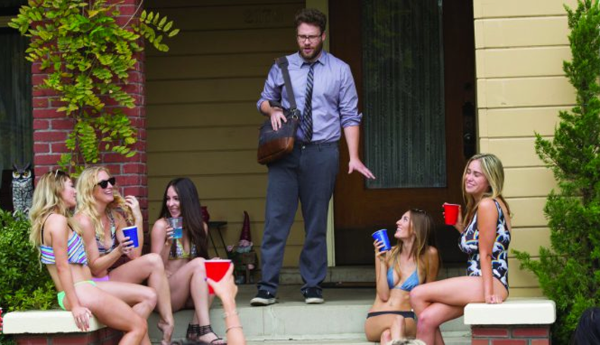
With a second child on the way, Mac and Kelly Radner (Rogen and Byrne) have 30 days in escrow until their house sells, a time in which any infraction or bad inspection could send the buyer running. Cue the ill-timed arrival of a brand-new sorority next door. Aided by Teddy (Efron), who is looking to relive his fraternity glory days, freshman Shelby (Moretz) and cohorts found Kappa Nu in order to buck a system that says only fraternities are allowed to throw parties.
The crux of the first film was the huge perceived generation gap versus the small actual gap between the early-twenties frat brothers and an early-thirties married couple. Gone are the awkward failed attempts by the Radners to bond with the youthful neighbors on their level, proving to their rivals and themselves that they “still got it.” Instead, Mac and Kelly seem to have accepted and moved past their empathetic existential crises of the first film: that they are no longer cool.
That internal conflict is replaced with the external, societal problem of systematic sexism in Neighbors 2. Whereas Neighbors portrayed the Radners as the protagonists only to slowly humanize their ribald rivals throughout the film, the equal rights, anti-sexist motivation of Kappa Nu sets them up as co-protagonists from the get-go. Rogen’s character is admirably progressive about Kappa Nu’s struggle, but making him so turns their conflict into nothing more than a standard turf war, relegating sexism to the level of escrow as an inciting incident.
The neutered conflict is supplemented by Efron’s Teddy, whose flip-flopping between the Kappa Nu’s and the Radners mirrors his own late-twenties floundering between being a Greek-row god and a well-adjusted adult. The rest of the cast is funny enough, yelling their way through a script with a running gag where a sex toy is mistaken for a baby’s toy, but it’s Teddy’s often hilarious realizations of his flawed worldviews that elevate the laughs with a bit of pathos.
Kappa Nu could have carried the film alone, its antagonist being an oppressive patriarchal system rather than the likable comedic chemistry of Seth Rogen and Rose Byrne, but that sounds like a different movie entirely; call it Dear White Penises. Instead, Neighbors 2 pits its dual protagonists against each other without seriously addressing the gender divide that replaced the generational gap as its comedy wellspring, landing it somewhere closer to the lower expectations I had for its surprising predecessor: entertaining, funny, forgettable.













